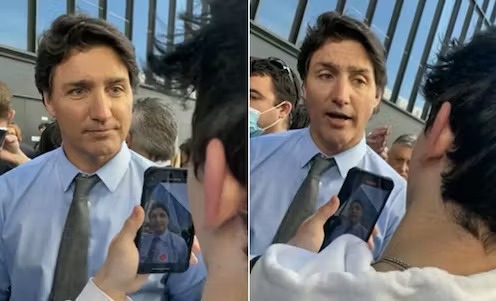Justin Trudeau led the Liberals to electoral victory in 2015, when the party began the federal election campaign with just three dozen MPs in the House of Commons.
Trudeau’s campaign platform promised Canadians significant reforms in several areas.
How has he fared? Let’s take a look.
Gender equity
Trudeau acted quickly to fulfil his promises on gender equality, appointing a cabinet that was — and continues to be — 50 per cent women.
Thanks to six consecutive Supreme Court of Canada appointments by Trudeau, there are more women than men on the court for the first time in Canadian history.
It seems unlikely that future prime ministers will be able to claim that there are insufficient qualified women in their caucus to maintain the 50 per cent female precedent set by Trudeau. The same applies to Supreme Court appointments, and those of other government bodies.
Indigenous agenda
Trudeau also acted quickly on his reconciliation agenda with Canada’s Indigenous communities.
Expectations were high, but only limited progress has been made on access to services such as drinking water, child welfare, housing and health care for First Nations, Inuit and Métis people.
However, there has been some movement on all fronts, and there is now public accountability and tracking.
A future government may not be as active as Trudeau’s Liberals in consulting with First Nations, Inuit and Métis leaders but the priority given to Indigenous Peoples in Canadian politics is unlikely to slide back to where it was in 2015.
Legal drugs
A controversial platform item in 2015 was the legalization of cannabis, which departed from the prohibitionist view held by previous governments of all political stripes.
By 2018, recreational cannabis sale and use was legal in Canada with relatively little opposition. At present, at the five-year mark, the policy is largely accepted, even if the public health outcomes are mixed.
It’s highly unlikely any future government would be able to roll back the legislative changes that now permit cannabis shops across Canada, from Watson Lake in Yukon to Happy Valley-Goose Bay in Labrador.
As the experience with the legalization of gambling shows, governments become addicted to the revenues generated and jobs created from creating consumer demand for previously illegal activities. Private-sector producers and retailers of cannabis would also fight against any attempt to shrink their market.
Other initiatives
Other noteworthy reforms under Trudeau include non-partisan Senate appointments, a carbon tax and early learning and child-care bilateral agreements. However, each of these is subject to reversal. A future prime minister may have different criteria in appointing senators.
The carbon tax remains precarious, with the Conservatives calling for a carbon tax election.
The child-care agreements with the provinces that will see fees decrease to $10 a day by 2026 have been made possible by federal funds that are too enticing for the premiers to pass up.
However, a future government may not have the same spending priorities, at which time the role of the state in child-care policy may shift yet again.
Will Trudeau resign?
There is no sign that Trudeau will depart before the next election even as the latest polls show his party trails the Conservatives. There is little precedent of Canadian prime ministers resigning before they must.
Stephen Harper, John Diefenbaker and Louis St. Laurent lost at the polls. Jean Chrétien was pushed out by his own party. William Lyon Mackenzie King and Lester Pearson resigned due to ill health.
Brian Mulroney and Justin Trudeau’s father, Pierre, resigned when polls over a long period of time made it abundantly clear they — and their parties — would be voted out of office.
Legacy lesson from the elder Trudeau?
Although some of Trudeau’s legacy is secure, none of it has redefined the nation and isn’t likely to do so in the future.
The last landmark achievement of a Canadian prime minister was 40 years ago, when Trudeau’s father succeeded in repatriating the Constitution from Great Britain and enshrining the Charter of Rights and Freedoms. This type of bold constitutional reform could provide inspiration to Justin Trudeau in how to cement his legacy.
Removing King Charles as Canada’s head of state is an attractive proposition if Trudeau needs votes in Québec, where the monarchy has never been popular.
It would also appeal to voters in Canada’s large urban areas, where immigration patterns have reduced the proportion of voters with a connection to the U.K.
For the Liberals to win the next election, after all, they require votes in Québec and in Vancouver, Toronto and Montréal.
Indigenous head of state?
Opening the Constitution for a homegrown head of state could also ensure future Indigenous heads of state like the current governor general appointed by Trudeau, Mary Simon. Governor generals serve as the monarch’s representative in Canada.
Constitutional reform proposals are fraught with dangers, as Mulroney well knows. His two attempts at constitutional amendment that would have decentralized the federation — the Meech Lake Accord in 1990 and the Charlottetown Accord in 1992 — consumed immense political capital but ultimately ended in failure.
But as Trudeau heads into what will likely be his last election, opening the Pandora’s box of constitutional reform might offer one route to secure a legacy that few other prime ministers can match.



 Trump to Address Nation as U.S. Launches Strikes in Iran, Axios Reports
Trump to Address Nation as U.S. Launches Strikes in Iran, Axios Reports  Trump Launches Operation Epic Fury: U.S. Strikes on Iran Mark High-Risk Shift in Middle East
Trump Launches Operation Epic Fury: U.S. Strikes on Iran Mark High-Risk Shift in Middle East  Netanyahu Suggests Iran’s Supreme Leader Khamenei May Have Been Killed in Israeli-U.S. Strikes
Netanyahu Suggests Iran’s Supreme Leader Khamenei May Have Been Killed in Israeli-U.S. Strikes  Trump Media Weighs Truth Social Spin-Off Amid $6B Fusion Energy Pivot
Trump Media Weighs Truth Social Spin-Off Amid $6B Fusion Energy Pivot  Pentagon Leaders Monitor U.S. Iran Operation from Mar-a-Lago
Pentagon Leaders Monitor U.S. Iran Operation from Mar-a-Lago  ICE Hiring Surge Raises Vetting Concerns Amid Rapid Expansion
ICE Hiring Surge Raises Vetting Concerns Amid Rapid Expansion  U.S.-Iran Nuclear Talks Show Progress but No Breakthrough Amid Rising Military Tensions
U.S.-Iran Nuclear Talks Show Progress but No Breakthrough Amid Rising Military Tensions  Australian PM Calls Alleged Western Australia Terror Plot “Deeply Shocking” After Arrest
Australian PM Calls Alleged Western Australia Terror Plot “Deeply Shocking” After Arrest  Trump Floats Ted Cruz for Future U.S. Supreme Court Nomination
Trump Floats Ted Cruz for Future U.S. Supreme Court Nomination  Israel Launches Fresh Strikes on Iran After Death of Supreme Leader Ayatollah Khamenei
Israel Launches Fresh Strikes on Iran After Death of Supreme Leader Ayatollah Khamenei  USITC to Review Impact of Revoking China’s PNTR Status, Potentially Raising Tariffs on Chinese Imports
USITC to Review Impact of Revoking China’s PNTR Status, Potentially Raising Tariffs on Chinese Imports  Israel Declares State of Emergency as Iran Launches Missile Attacks
Israel Declares State of Emergency as Iran Launches Missile Attacks  Pakistan-Afghanistan Tensions Escalate as Taliban Offer Talks After Airstrikes
Pakistan-Afghanistan Tensions Escalate as Taliban Offer Talks After Airstrikes  Pentagon to Halt Ivy League Programs for U.S. Military Officers Starting 2026
Pentagon to Halt Ivy League Programs for U.S. Military Officers Starting 2026  Federal Judge Blocks Virginia Social Media Age Verification Law Over First Amendment Concerns
Federal Judge Blocks Virginia Social Media Age Verification Law Over First Amendment Concerns  Philippines, U.S., and Japan Conduct Joint Naval Drills in South China Sea to Boost Maritime Security
Philippines, U.S., and Japan Conduct Joint Naval Drills in South China Sea to Boost Maritime Security  Germany and China Reaffirm Open Trade and Strategic Partnership in Landmark Beijing Visit
Germany and China Reaffirm Open Trade and Strategic Partnership in Landmark Beijing Visit 
































